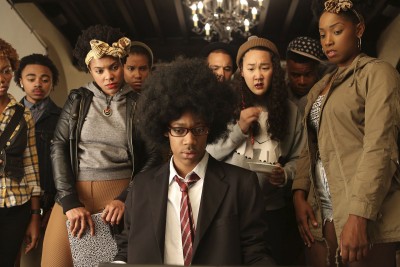
With the high-profile deaths of unarmed black men Michael Brown and Eric Garner during the summer of 2014, discussions about race seem to be featured in media everywhere — from CNN to Twitter feeds.
Boston University’s Howard Thurman Center for Common Ground is looking to bring that conversation to campus. On Feb. 11 at the Tsai Performance Center, the HTC will host a screening and panel discussion of Justin Simien’s “Dear White People,” which won the U.S. Dramatic Special Jury Award for Breakthrough Talent at the 2014 Sundance Film Festival.
“What I’m trying to do with this film and other programs at the Howard Thurman Center is to create platforms for people to start having better conversations about race,” said Christian Cho, assistant director of the Howard Thurman Center.
Cho, who planned the screening for BU, stressed the need for conversation, especially with regard to higher education, and said a movie such as “Dear White People” could provide an outlet for students to have that conversation on campus.
“For students who know about race and racism, it’s going to reaffirm their understanding of race and racism in a refreshing way,” Cho said. “But for a lot of students who aren’t aware of race and racism but want to learn more, it’s a funny way and low-risk way to learn about how race does come into play in higher education.”
The film, which earned a 92 percent rating from popular film review aggregator Rotten Tomatoes, focuses on several African American students in a fictional and predominantly white university.
“In the end, we have to understand that each character in the film has elements of his [the director’s] own experience,” Cho said. “For a lot of black students and for a lot of students that are not white, [they] will identify with the four characters in some way.”
Victoria Dutcher-Brown, a sophomore in CAS and a volunteer and events coordinator for BU’s Center for Gender, Sexuality and Activism, said BU could benefit from the sort of conversations that she hopes events like the screening will spur.
“Race discussion at BU is abysmal. It needs to be brought to higher attention. We barely talk about it,” Dutcher-Brown said. “If we do, we glaze over it, and someone says a quote from [Martin Luther King, Jr.] … While we recognize MLK went to BU, we don’t always remember all the things he believed in.”
Dutcher-Brown said one of the scenes in “Dear White People” reflects the need for conversation. In the scene, a white male college student says, “Sometimes, I think the hardest thing to be in the American workforce is an educated white guy.”
Statements like this, Dutcher-Brown said, show the “ridiculousness of reverse racism or other issue areas like ‘meninism,’ people who believe that due to other issues, they’re oppressed even though historically and systematically, they’ve been the oppressor.”
CGSA, too, has worked to ignite discussion about race and other issues within the BU community. This past year, the center began hosting BU group People of Color Coalition every other week. The group explores race on campus, in the media, in government and more, providing both a safe space for conversation and a jumping-off point for bigger endeavors.
“People go to different protests, rallies or hear people speak to present a solid front,” Dutcher-Brown said. “It’s often scary if you haven’t been to a protest. If people want to go to a protest, the center provides the place for people to meet.”
That communal approach is something Cho said he is aiming for. All students need to be comfortable with talking, he said, if they’re going to talk at all.
“While we are a ‘diverse’ place, if we’re not bridging the gaps and we’re not leaving social circles, nothing’s going to change,” he said. “I hope people feel comfortable enough to have conversations with people whose experiences are different, whose opinions are different about race, whose outlooks are very different.”
Although the screening and other similar events last only one night, both Cho and Dutcher-Brown said conversations about race cannot stop when the house lights go up.
“It’s just that we as a country have come to the place where we tell white people they can’t talk about race,” Cho said. “We have to make room for people to learn, and we have to make room and be okay with ugliness.”


















































































































